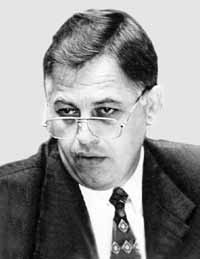Church Proletarian Internationalism

Recently the contacts between Moscow Patriarch Aleksiy and the Ukrainian politicians have become more frequent. As we know, a meeting took place in Moscow in late November between the President of Ukraine and the Moscow Patriarch, where the problem of the Ukrainian Orthodoxy was discussed. Leonid Kuchma again turned to the Patriarch with a request to give the Ukrainian Orthodox Church, Moscow Patriarchate, a statute of autonomy and again received a flat refusal under the pretext that the Ukrainian Orthodox believers do not need church independence. Thus giving them autonomy, in Patriarch’s opinion, would inevitably lead to mass transfer of the Ukrainian dioceses to the Russian Orthodox Church under direct patriarchal jurisdiction.
Asking the Moscow Patriarch as well as Russian President Putin, for autonomy for the Ukrainian Orthodox Church is like asking a wolf to unclench his jaws and let go a lamb. The so-called Moscow Patriarchate’s geopolitics consists precisely in preserving strong influence on its canonical territories on the basis of unified Orthodoxy, and also in enjoying influence on the international religious organizations, dictating its will, which is possible only for a strong and very large church. It is a question of the Russian Church’s “missionary counterattack,” not its further splitting up, according to the Russian Orthodox publicist Kirill Frolov. And here are we, Ukrainians, with our “local” problems!
As reports the Russian Orthodox Church official web site, on December 6, 2001, a meeting of Patriarch Aleksiy with another Ukrainian politician, Communist Party leader Petro Symonenko, took place. Here, in contrast to the meeting with the president, the coincidence in views was absolute. Mr. Symonenko informed the Moscow Patriarch on the position of his corps of Verkhovna Rada towards the Constantinople Patriarch’s participation in solving the Ukrainian church issue. The Verkhovna Rada deputies sent a letter to Patriarch Bartholomew with a request not to support unilateral contacts with Ukrainian “uncanonical” formations outside the program of common action with the Moscow Patriarchate (note that far from all deputies signed this letter — Author).
Symonenko also claimed full and unconditional support of the Ukrainian Orthodox Church, Moscow Patriarchy, in its opposing the so- called uncanonical groups. “Unlike others, we protect canonical Orthodoxy in Ukraine in deed, protesting against arbitrariness toward the UOC from both central and local authorities.”
Patriarch Aleksiy approved of the Ukrainian Communists’ position toward illegal repression against the clergymen and believers in the Soviet period. As we know, on September 18, 2001, Symonenko declared on behalf of his party, “We apologize to the Orthodox Christians and believers of other confessions for their sufferings and hardships in the dark years. We will not tolerate such a policy to be repeated and will do everything to assure believers in our sincerity in admitting these sad pages of history.”
Incidentally, people have waited a long time to the Ukrainian Communists to apologize for past CPSU actions not only to the faithful and not only on election eve. It would be also interesting to find out on the ground of what doctrine the Communists respect the Church canons so much that they sacrifice the idea of Ukrainian Orthodox Church’s independence for their own sake?






